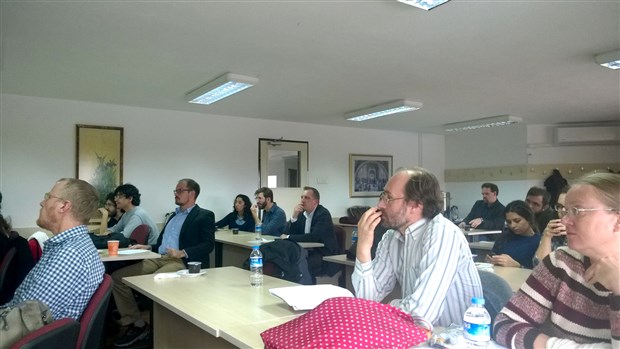Last Thursday, Bilkent was host to a workshop on logical fallacies and a full-day series of talks in honor of World Philosophy Day, a UNESCO-organized event that celebrates both the intellectual value and practical applications of philosophy. The theme of 2014 was intercultural dialogue, a topic that is of fundamental importance to philosophy—respectful communication between both like-minded and opposing practitioners is an integral part of the discipline, and intercultural dialogue is a particularly attractive means of opening one’s mind to new concepts and ideas.
True to this year’s theme, the conference at Bilkent reflected the full diversity of ideas inherent to philosophical schools of thought, albeit through a different lens—that of analytical philosophy. More of a methodology than a school of thought, the principles of analytical philosophy have been applied to a great diversity of subjects, making it a complex yet far-reaching field—a fact emphasized by seminar organizer Dr. Jack Woods in his introductory speech. Mindful of potential disconnects between philosophy and the fields that are subject to its analysis, Dr. Woods’ talk also covered the interactions between disciplines such as the history of philosophy and philosophy, the philosophy of science and science, and the philosophy of art and art.
Dr. Simon Wigley’s presentation focused on the idea of punishment-worthiness, discussing whether the presence of an alternative course of action is necessary for apprehension, and whether blame and punishment should be doled out depending on separate criteria—in other words, whether we can blame someone for a crime, and yet not be justified in punishing them. Underlining the fact that blame may qualify as a type of punishment in and of itself, Dr. Wigley argued that the use of two distinct criteria is an untenable position, and proposed an alternative where even actions with no reasonable alternative may render the actor culpable and worthy of apprehension.
The flip side of proper dialogue was also covered by the conference: the very possibility of adequate communication was questioned by Dr. Nurbak Irmak, who argued that no serious debate of ontology (the branch of philosophy that deals with the existence of objects and concepts) can be possible. Each ontologist, he declared, is subject to his own presuppositions about the meaning of “there is,” and constructs a type of “ontological language” that is no better or worse than the “languages” of other ontologists. Ontological debates, therefore, are little more than petty fights over semantics—and even if one of these “languages” were truly superior to all others, its conclusions might not be of any consequence to regular old English.
The consequences of inconsideration and a lack of dialogue were also the subject of Dr. Sandrine, who discussed the suppression of the considerable role women have played in the history and development of philosophy. While male philosophers, serving as the avatars of the archetypal wise old man, were often taken seriously in their intellectual endeavors, women hardly had such luck—despite their expertise, and much to the detriment of philosophy at large. Such inequality is not only a feature of the civilizations of old, however: these prejudices are still very much a part of today’s society, and the philosopher-as-bearded-old-man image, although ungrounded in reality, still persists in the modern world.
Analyzing equality and the common good on a broader scale, Dr. Harry Platanakis argued that the common definitions of “democracy” are not necessarily capable of outlining a specific set of properties inherent to democracies, emphasizing instead the aims and goals that an ideal democracy would have. Applying the Aristotelian concept of “phronimos” to modern democracies, Dr. Platanakis suggested that communities that established channels of dialogue among their component members would be able to truly create the atmosphere of equality that a democracy ought to have, thus defining a concept of “democracy” complete both in form and in function.
The last talk of the day was given by Dr. Derek Baker, and covered a subtle form of dialogue: that which occurs between one’s attitudes and self-knowledge of those attitudes. Using the analogue of self-evaluation and the judicial system, Dr. Baker outlined a process in which one’s attitude is judged to determine whether it is in accordance with a self-professed stance—if not, these stances (or “laws”) can be changed, thus serving to both justify present actions and determine future behavior.
Although the topics covered were diverse in the extreme, dialogue between the presenters and the attendees was certainly not lacking, either—the seminar was enriched by enlightening discussions after each session.

